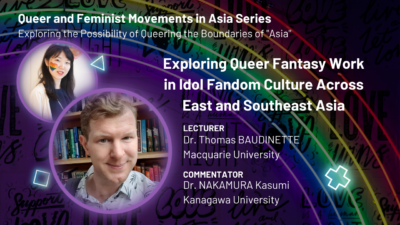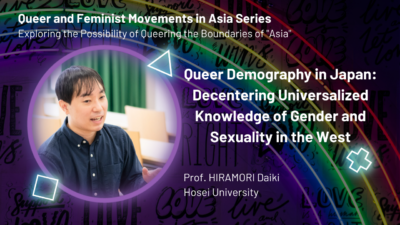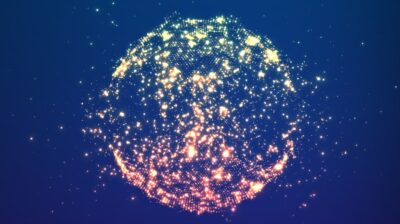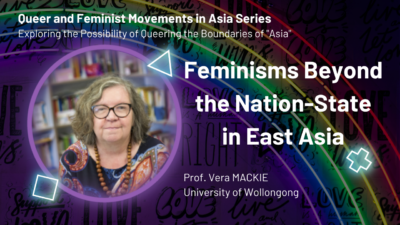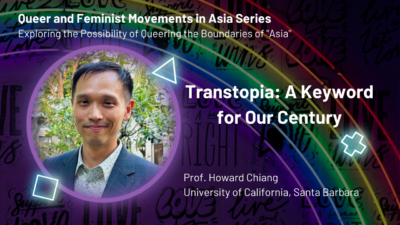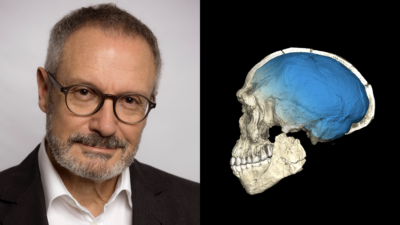From Competitors to Partners: Banks’ Venture Investments in Fintech (Lecture by Prof. Manju PURI)
イベント予定講演会/LectureTuesday, 12 November 2024 10:30-12:00 JST
Towards Building Multicultural and Multilingual Safe Large Language Models
イベント予定講演会/LectureMonday, 11 November 2024, 10:00-11:00 JST
Economic Policies under Japan’s New Cabinet: Wish List and Prospects
イベント予定パネルディスカッション/Panel discussion共催/Joint EventFriday, 8 November 2024 8:00 - 9:15 JST
50 Ways to Kill a Robot (Lecture by Prof. Jennifer ROBERTSON)
イベント予定講演会/LectureTuesday, 5 November 2024 10:30-12:00 JST
Exploring Queer Fantasy Work in Idol Fandom Culture Across East and Southeast Asia (Lecture by Dr. Thomas BAUDINETTE)
イベント予定講演会/LectureFriday, 1 November 2024 14:00-15:30 JST
Queer Demography in Japan: Decentering Universalized Knowledge of Gender and Sexuality in the West (Lecture by Prof. HIRAMORI Daiki)
イベント予定講演会/LectureThursday, 24 October 2024 15:00-16:30 JST
Transnational Think Tanks: Shaping Futures (Lecture by Prof. Christina GARSTEN)
イベント予定講演会/LectureWednesday, 23 October 2024, 10:30-12:00 JST
[Rescheduled] Feminisms Beyond the Nation-State in East Asia (Lecture by Prof. Vera MACKIE)
イベント予定講演会/LectureWednesday, 16 October 2024 15:00-16:30 JST
Transtopia: A Keyword for Our Century (Lecture by Prof. Howard CHIANG)
イベント予定講演会/LectureFriday, 6 September 2024, 9:00-10:30 JST
”Does AI make people happy?” ”Is it dangerous?” – Global AI Dialogue Call for Participants in Interactive workshop on Artificial Intelligence
対話/DialogueSaturday, 24 August, 2024, 10:00 - 13:30 (Doors open: 9:45)
Panel discussion “The Economy of Japan Viewed from the Outside” (Speakers: Prof. Takatoshi ITO, Prof. Nobuhiro KIYOTAKI)
イベント予定パネルディスカッション/Panel discussionFriday, 23 August 2024, 16:00-17:30 JST
UTokyo’s Unbalanced Gender Ratio: An Interactive Roundtable
座談会/RoundtableThursday, 25 July 2024 15:00-16:30 (Doors open: 14:30)
Is this the Age of Disinformation or the Age of Strategic Communications? (Lecture by Dr. Neville BOLT)
イベント予定講演会/LectureMonday, 22 July 2024, 14:30-16:00 JST
Book Launch “The Faraway Sky of Kyiv. Ukrainians in the War” (Lecture by Dr. Olga KHOMENKO)
イベント予定講演会/LectureFriday, 28 June 2024, 15:30-16:30
A Cultural History of Hacking (Lecture by Prof. Federico MAZZINI)
イベント予定講演会/LectureMonday, 24 June 2024, 15:00-15:45
The Salon ー Conversations with Prominent Professors at the University of Tokyo (Season 2)
イベント予定対話/DialogueEvery Friday from June 7, 2024 (Available from 17:00 JST)
The Future of Globalization: A History (Lecture by Bill EMMOTT)
イベント予定講演会/LectureTuesday, 4 June 2024, 16:00-17:30 JST
Family-run Medical Institutions in Japan (Lecture by Prof. Roger GOODMAN)
イベント予定講演会/LectureThursday, 30 May 2024, 14:00-15:30 JST
Central Banks in the 21st Century (Lecture by Prof. Luiz Awazu PEREIRA DA SILVA)
イベント予定講演会/LectureWednesday, May 29th, 2024, 15:00-16:30 JST
The Putative Unity of the West: On Anthropological Difference (Lecture by Prof. SAKAI Naoki)
イベント予定講演会/LectureFriday, 17 May 2024, 14:00-15:30 pm JST
Thinking through Permafrost (Lecture by Prof. Sabine DULLIN)
イベント予定講演会/LectureTuesday, 14 May, 2024, 16:30-18:00 JST
What is a Global Historian’s Archive? (Lecture by Prof. Martin DUSINBERRE)
イベント予定講演会/LectureFriday, 10 May 2024, 10:30-12:00 JST
The Origin and Rise of Homo sapiens (Lecture by Prof. Jean-Jacques HUBLIN)
イベント予定講演会/LectureThursday, 9 May 2024, 2:00-3:30 pm






